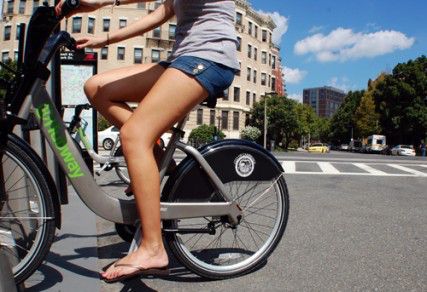
After its first year of maintaining a bike-sharing system city officials have deemed successful, the New Balance Hubway system is expanding its network throughout the greater Boston area.
Hubway started adding 11 stations around the city as it expands to neighboring towns such as Brookline, Somerville and Cambridge.
“It’s important to understand that this is about so much more than bicycles,” said Hubway General Manager Scott Mullen. “It’s about congestion mitigation, air quality, extending and supplementing the existing transit network.”
The first year was “remarkably successful,” said Kris Carter, the Interim Director of Boston Bikes, and has “blown away any projections we had about the system.”
The Hubway Bike Share program celebrated its first birthday in July with Boston Mayor Thomas Menino, one of the driving forces behind the bicycle movement.
Between July and November, more than 3,700 annual members and 30,000 casual users logged more than 140,000 rides, according to a press release from Menino’s office.
These numbers increased since the re-opening of Hubway in March, with Hubway now boasting more than 5,000 members and more than 150,000 rides.
But expansion does not come easily, Mullen said.
“These stations cost roughly $50,000 each, which is why sponsors and donors are so key to the program,” he said.
The Hubway rental model accommodates short-term users as well as those willing to pay annually.
Users who ride often can purchase annual memberships, while casual users can purchase a 24-hour access pass with various fees.
“It’s not very effective for locals, but convenient for out-of-town students and tourists,” said College of General Studies freshman Benjamin Daugherty, who uses a bike for transportation. “The locals either already have bikes or are not willing to pay for them, except on rare occasions.”
While there has been positive feedback to the program, there has been some concern from Boston drivers regarding the safety practices of the cyclists, Carter said.
School of Management sophomore Pablo Fuentes, who uses his black Volkswagen Jetta every day and parks it at the Dexter apartment complex in Brookline, said he supports having alternative transportation options, especially to increase available parking.
But bikers should follow traffic rules just like vehicle drivers do, he said.
“It’s very dangerous to have bikers running red lights,” he said.
Red lights are not the only safety measures bikers ignore.
Although Hubway users are required to wear a helmet, only one in five bike share users actually wear one, according to a study from Beth Israel Deaconess Medical Center published in April.
Daugherty said he regularly sees Hubway riders without helmets, which he called a safety concern.
“I think that they should also provide helmets for biker safety,” Carter said.
With expansion and possible reform coming from Hubway in future years, Carter said, he expects more great things to come.
“There is no limit to the potential of bike share at this point,” Mullen said. “If you think about investment in transit, the bang for your transit buck is in bike share—just pennies on the dollar compared to light rail.”
This is an account occasionally used by the Daily Free Press editors to post archived posts from previous iterations of the site or otherwise for special circumstance publications. See authorship info on the byline at the top of the page.



